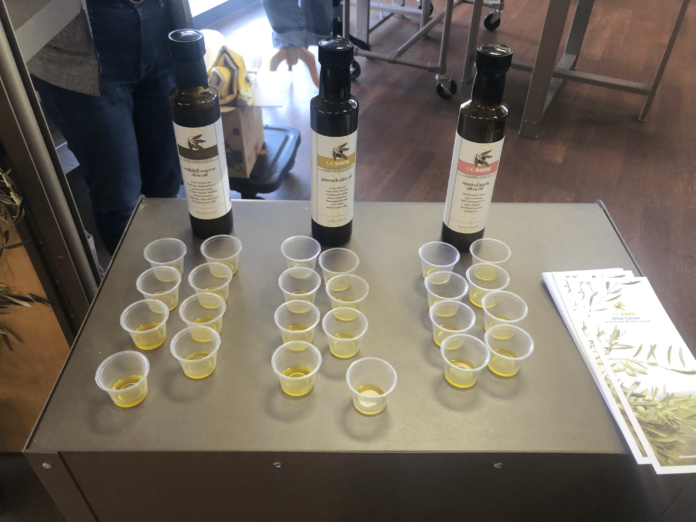To promote the release of Olio Nuovo, the UC Davis Olive Center hosted a festival downtown to celebrate
By MONICA MANMADKAR — city@theaggie.org
On Saturday, Nov. 20, the UC Davis Olive Center celebrated the release of their newest olive oil with the Olio Nuovo Festival. The festival included a tasting of the three current olive oils along with their newest addition: Wolfskill, Gunrock, Roasted Garlic and Olio Nuovo. Each bottle contains different olive varieties produced from the olives grown at UC Davis’ historic Wolfskill Ranch, where olives have been grown since 1842.
The Roasted Garlic Infused Olive Oil is 90% extra virgin olive oil and 10% garlic oil. Wolfskill, Gunrock and Olio Nuovo are extra virgin olive oils. Shirley Li, the assistant director of the UC Davis Olive Center, said that there are different olive varieties that go into each type of olive oil, with the process of making each olive oil being different as well. The olives are from the Wolfskill Experimental Orchards near Winters of about four acres.
The Olio Nuovo is the new olive oil released this week, made with the first olives that were picked to harvest and bottled very soon after they were picked, according to the UC Davis Olive Center Website. This means that the oil is best when consumed as soon as possible after its bottling.
Li said there are many steps to making the oil from the fruit. There is a shaker that shakes the trunk of the olive trees, making the fruit fall into a tarp on the ground. The fruit is then transferred to a bin and taken to a mill. At the mill, the olives are sorted, washed and crushed to malaxation. Malaxation is the kneading process that squeezes the oil out of the olive paste. The squeezed oil is sent to a centrifuge at the lab. The malaxation process varies depending on the oil and usually takes up to two hours. Some millers may do the kneading process for over an hour and others will for less than an hour, Li said.
The longer you malax the oil or the longer you knead the oil paste means it also generates more heat. According to Li, this means the higher your chances are of compromising the quality of the oil.
Li has been a part of the Olive Center since her fourth year at UC Davis. She continued her studies at UC Davis as a Master’s student, studying food science with a concentration in food chemistry.
“I was looking for an internship in the food science department, and I found the lab at the Olive Centerm,” Li said. “They were doing research on the chemistry behind olive oil. I learned a lot of techniques because of my concentration, but I was able to apply it while I was analyzing olive oil in the lab.”
Along with Li, Vici Thahir, a fourth-year undergraduate studying food science, was also volunteering at the event. She has been a part of the Olive Center Laboratory since her second year.
“I love it here,” Thahir said. “I am able to learn so much about olive oil and [get] hands on experience on the different chemical analysis, and am able to connect what I am learning for my major with what I am doing in the lab.”
This event hopes to bring more sales and attention to the UC Davis Olive Center. Any of the sales supports the UC Davis Olive Center at the Robert Mondavi Institute, and the center seeks to build California’s crop.
Held at the UC Davis Store downtown, customers were able to sample the different oils, Wolfskill, Gunrock and Roasted Garlic, with some bread while shopping. One of the customers, Abhineet Kaur, a first-year biomedical engineering student at UC Davis, described how great the UC Davis Olive Center was for holding this festival.
“I really love how the Olive Center is promoting local businesses and the school,” Kaur said. “I am glad that when I buy a bottle I know that I am able to support the students, the center and the research at the Olive Center.”
Established in 2008, the Olive Center is part of the UC Davis agricultural community and is a resource for students who wish to continue their education in food science.
Written by: Monica Manmadkar — city@theaggie.org




